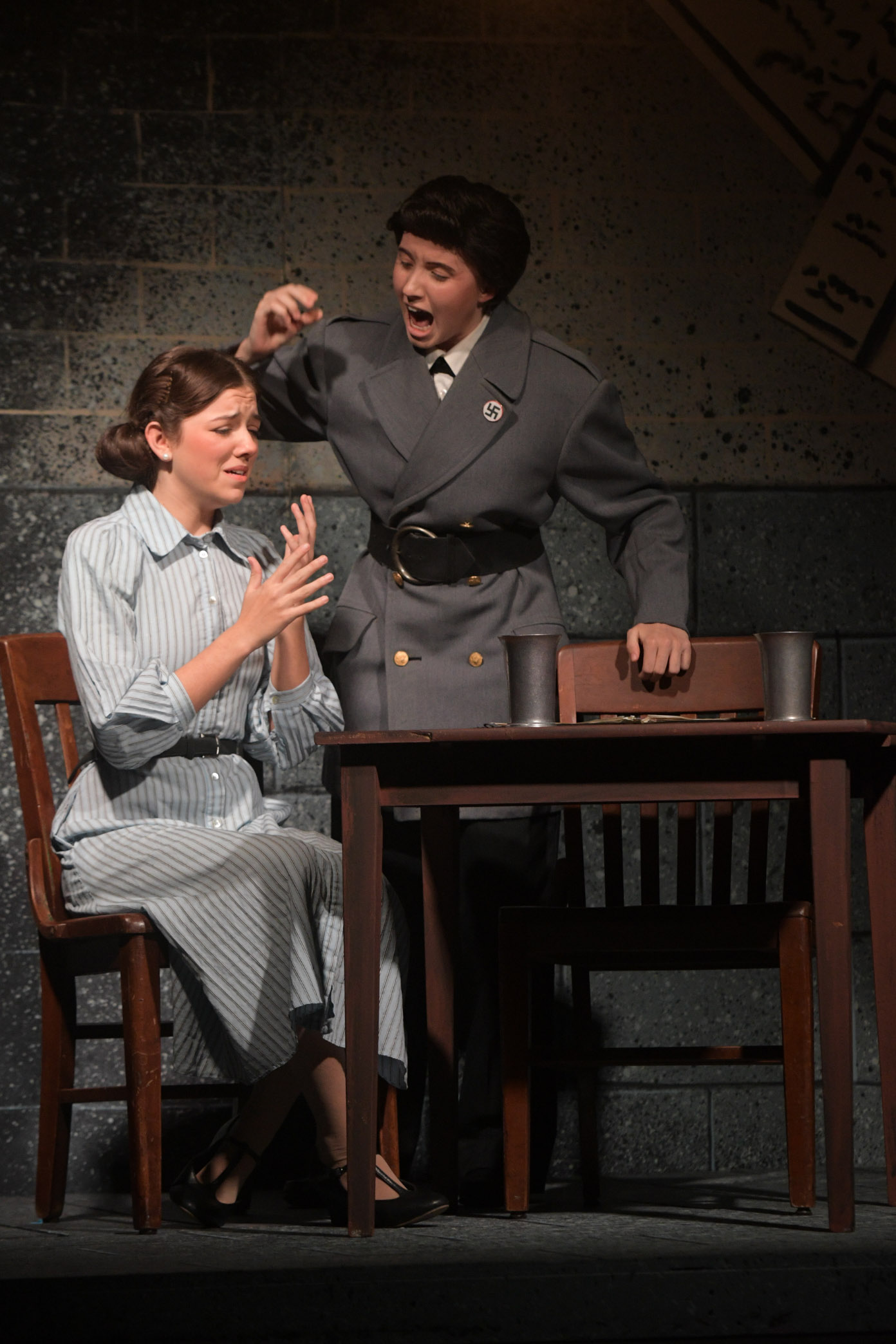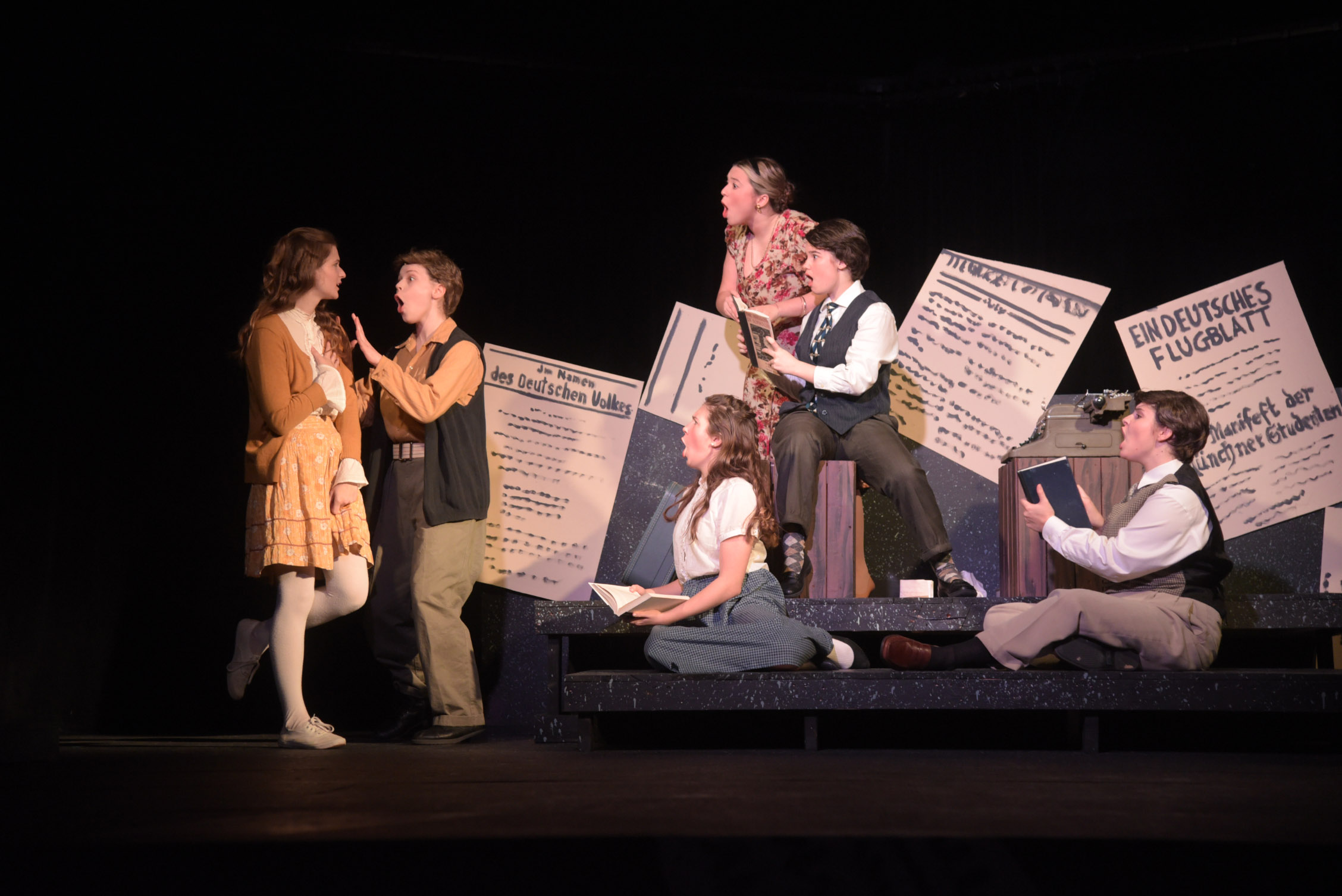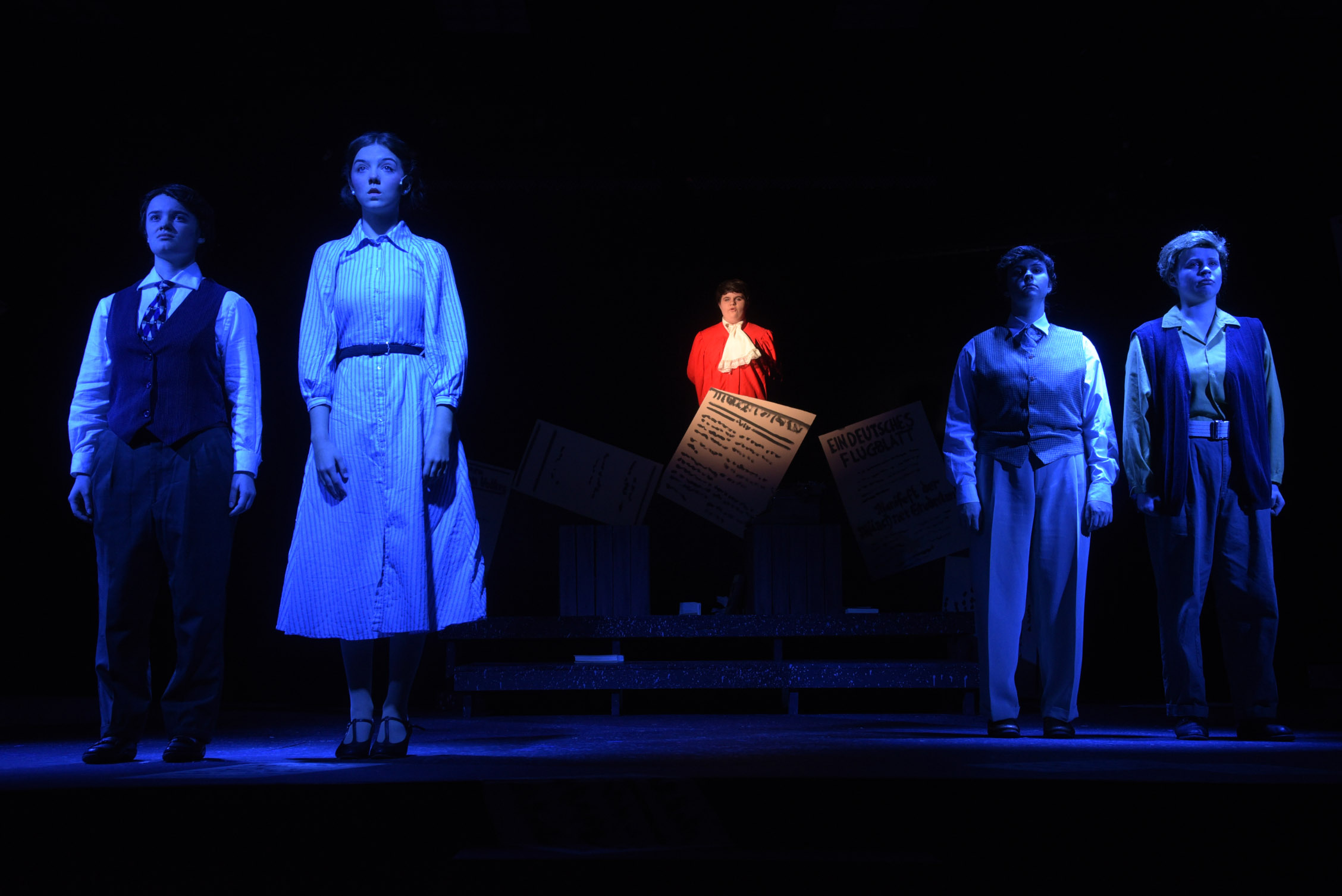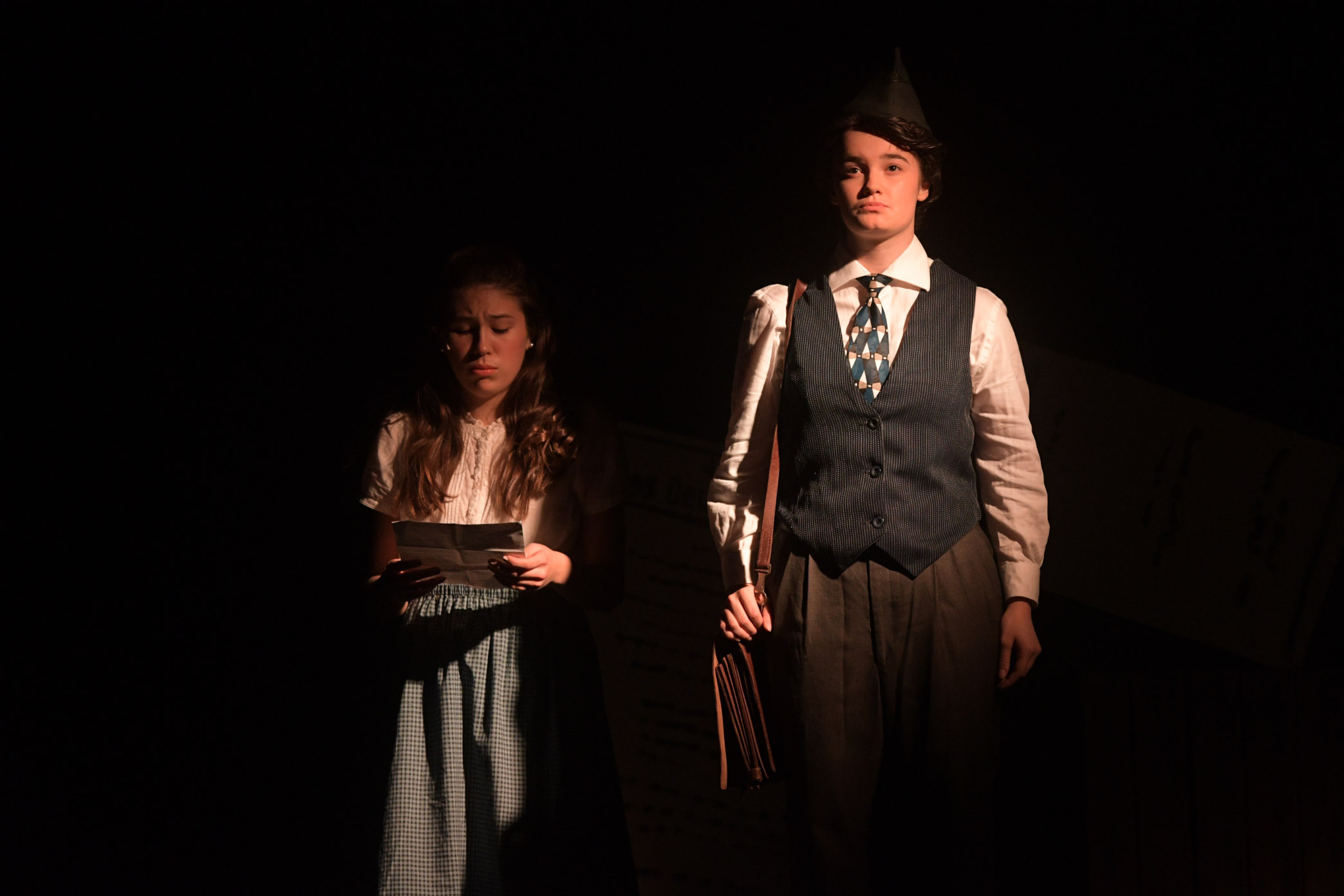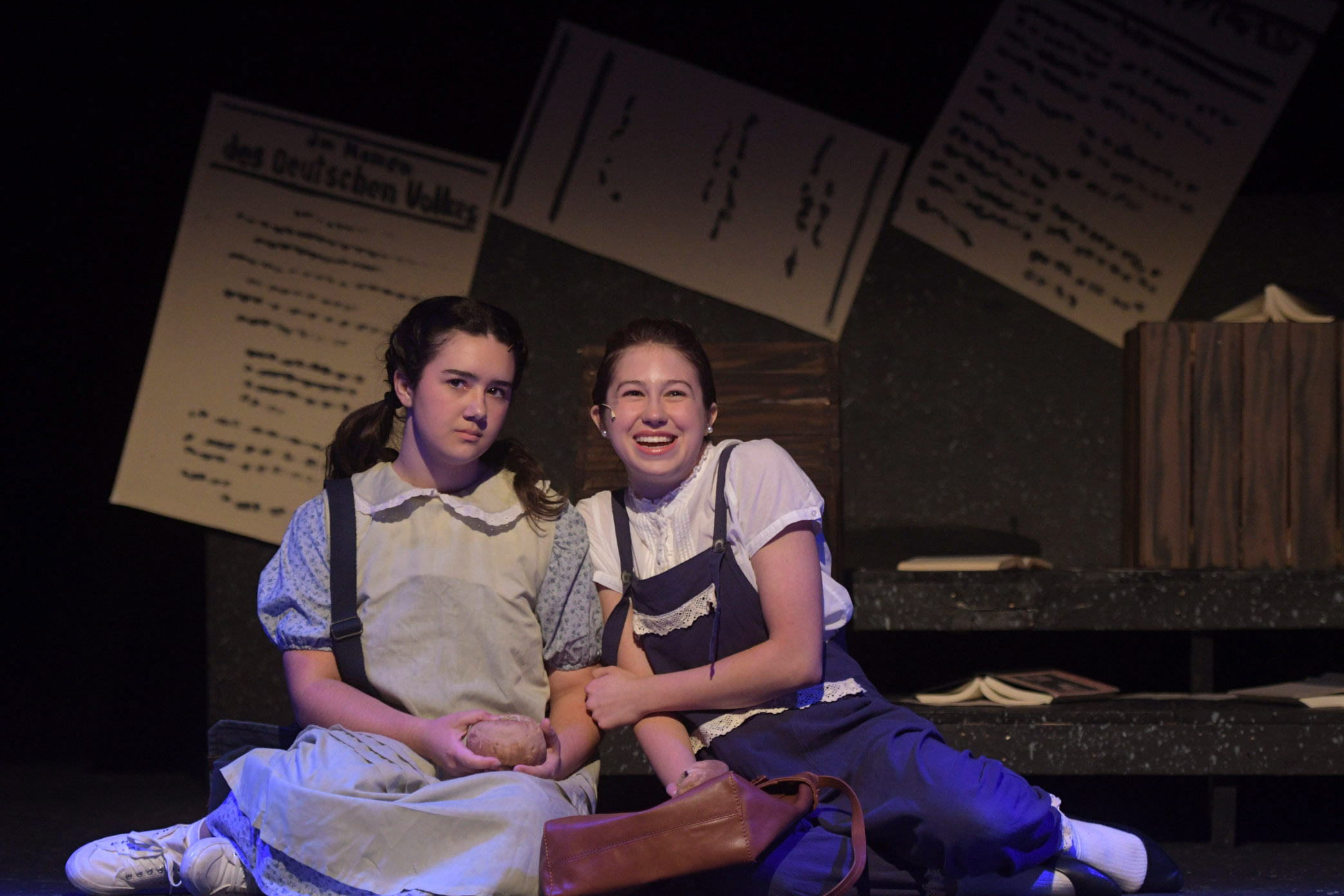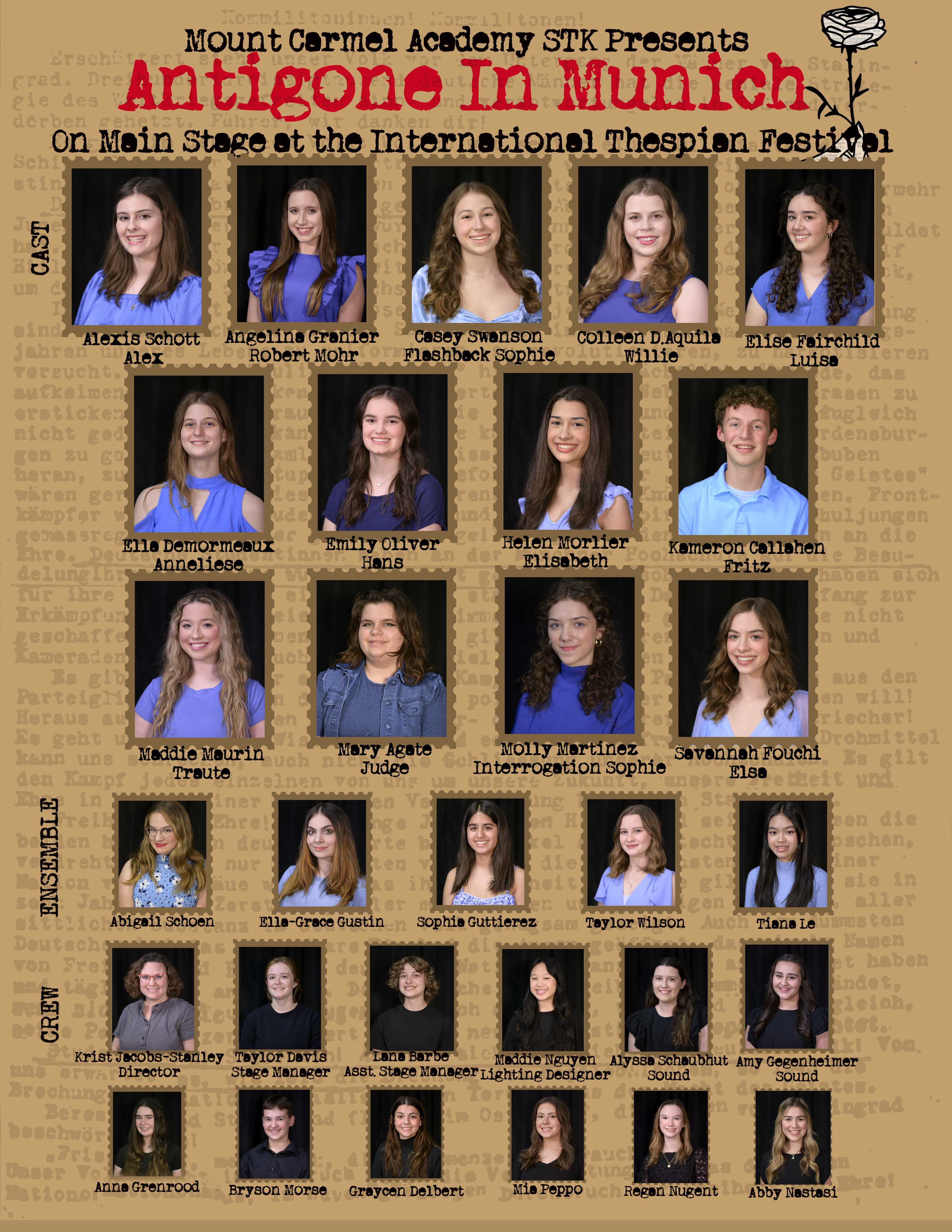Notes from an English Teacher
Notes from an English teacher -- Antigone in Munich
The story of Sophie Scholl reminds us of the power of literature to inspire, inform, and mirror our lives.First performed almost 2,500 years ago, the ancient tale of Antigone with its themes of loyalty, faith, and courage continues to reverberate through the centuries, and the true story of Sophie, her brother Hans, and their friends shows us that young members of society can have the power to move their worlds, even when the adults don’t seem to have any power. Our knowledge of the White Rose Society is overshadowed by the more horrific and better known truths of World War II, but it’s important to realize that there were Germans, good people trapped within the evil, working from within to right the wrongs of their government, just as all people can recognize their own responsibility to right social wrongs -- an important Catholic Social Justice teaching.
For further reading about Sophie and the White Rose Society:
At the Heart of the White Rose: Letters and Diaries of Hans and Sophie Scholl. Inge Jens, editor.
Dunbach, Annette, and Jud Newborn. Sophie Scholl and the White Rose.
Wilson, Kip. White Rose. (historical fiction based on the true story)
We also recommend the following books:
Middle School (grades 4-8)
Lois Lowry. Number the Stars.
Ten Boom, Corrie. The Hiding Place.
Yolen, Jane. Briar Rose.
Yolen, Jane. The Devil’s Arithmetic.
High School (grades 9-12)
Boyne, John. The Boy in the Striped Pajamas.
Frank, Anne. The Diary of a Young Girl.
Speigelman, Art. Maus. (graphic novel)
Wein, Elizabeth. Code Name Verity.
Wein, Elizabeth. Rose under Fire.
Weisel, Elie. Night.
Zuzak. Markus. The Book Thief.
Understudy Cast
| Cara |
Folse |
US Interrogation Sophie |
| Taylor |
Wilson |
US Flashback Sophie |
| Ella-Grace |
Gustin |
US Hans |
| Mary |
Agate |
Mohr/US Judge |
| Alayna |
Madden |
US Luisa |
| Lauren |
Buisson |
US Elisabeth |
| Matthew |
Butler |
US Fritz |
| Tiana |
Le |
US Elsa |
| Lia |
Revere |
US Alex |
| Sophia |
Gutierrez |
US Traute |
| Abigail |
Schoen |
US Willi |
The White Rose Society -- The Leaflets
For more pictures and translations of the other five White Rose Leaflets, go to http://holocaustresearchproject.org/revolt/wrleaflets.html
White Rose Leaflets
The 1st Leaflet:
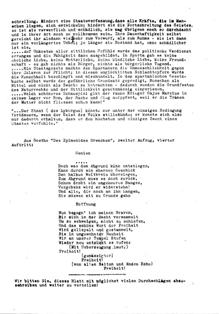
Page 2
Translation:
Nothing is so unworthy of a civilized nation as allowing itself to be governed without opposition by an irresponsible clique that has yielded to base instinct. It is certain that today every honest German is ashamed of his government. Who among us has any conception of the dimensions of shame that will befall us and our children when one day the veil has fallen from our eyes and the most horrible of crimes - crimes that infinitely outdistance every human measure - reach the light of day?
If the German people are already so corrupted and spiritually crushed that they do not raise a hand, frivolously trusting in a questionable faith in lawful order of history; if they surrender man’s highest principle, that which raises him above all other God’s creatures, his free will; if they abandon the will to take decisive action and turn the wheel of history and thus subject it to their own rational decision; if they are so devoid of all individuality, have already gone so far along the road toward turning into a spiritless and cowardly mass - then, yes, they deserve their downfall. Goethe speaks of the Germans as a tragic people, like the Jews and the Greeks, but today it would appear rather that they are a spineless, will-less herd of hangers-on, who now - the marrow sucked out of their bones, robbed of their center of stability - are waiting to be hounded to their destruction.
So it seems - but it is not so. Rather, by means of gradual, treacherous, systematic abuse, the system has put every man into a spiritual prison. Only now, finding himself lying in fetters, has he become aware of his fate. Only a few recognized the threat of ruin, and the reward for their heroic warning was death. We will have more to say about the fate of these persons. If everyone waits until the other man makes a start, the messengers of avenging Nemesis will come steadily closer; then even the last victim will have been cast senselessly into the maw of the insatiable demon. Therefore every individual, conscious of his responsibility as a member of Christian and Western civilization, must defend himself as best he can at this late hour, he must work against the scourges of mankind, against fascism and any similar system of totalitarianism.
Offer passive resistance - resistance - wherever you may be, forestall the spread of this atheistic war machine before it is too late, before the last cities, like Cologne, have been reduced to rubble, and before the nation’s last young man has given his blood on some battlefield for the hubris of a sub-human. Do not forget that every people deserves the regime it is willing to endure!
From Freidrich Schiller’s The Lawgiving of Lycurgus and Solon:
Viewed in relation to its purposes, the law code of Lycurgus is a masterpiece of political science and knowledge of human nature. He desired a powerful, unassailable start, firmly established on its own principles. Political effectiveness and permanence were the goal toward which he strove, and he attained this goal to the full extent possible under possible under the circumstances.
But if one compares the purpose Lycurgus had in view with the purposes of mankind, then a deep abhorrence takes the place of the approbation which we felt at first glance. Anything may be sacrificed to the good of the state except that end for which the State serves as a means. The state is never an end in itself; it is important only as a condition under which the purpose of mankind can be attained, and this purpose is none other than the development of all man’s power, his progress and improvement.
If a state prevents the development of the capacities which reside in man, if it interferes with the progress of the human spirit, then it is reprehensible and injurious, no matter how excellently devised, how perfect in its own way. Its very permanence in that case amounts more to a reproach than to a basis for fame; it be comes a prolonged evil, and the longer it endures, the more harmful it is....
At the price of all moral feeling a political system was set up, and the resources of the state were mobilized to that end. In Sparta there was no conjugal love, no mother love, no filial devotion, no friendship; all men were citizens only, and all virtue was civic virtue.
A law of the state made it the duty of Spartans to be inhumane to their slaves; in these unhappy victims of war humanity itself was insulted and mistreated. In the Spartan code of law the dangerous principle was promulgated that men are to be looked upon as means and not as ends - and the foundation of natural law and of morality were destroyed by that law....
What an admirable sight is afforded, by contrast, by the rough soldier Gaius Marcius in his camp before Rome, when he renounced vengeance and victory because he could not endure to see a mother’s tears!...
The state [of Lycurgus] could endure only under the one condition: that the spirit of the people remained quiescent. Hence it could be maintained only if it failed to achieve the highest, the sole purpose of a state.
From Goethe’s The Awakening of Epimenides, Act II, Scene 4.
SPIRITS:
Though he who has boldly risen from the abyss
Through an iron will and cunning
May conquer half the world,
Yet to the abyss he must return.
Already a terrible fear has seized him;
In vain he will resist!
And all who still stand with him
Must perish in his fall.
HOPE:
Now I find my good men
Are gathered in the night,
To wait in silence, not to sleep.
And the glorious word of liberty
They whisper and murmur,
Till in unaccustomed strangeness,
On the steps of our temple
Once again in delight they cry:
Freedom! Freedom!
Please make as many copies of this leaflet as you can and distribute them.
Sophie Scholl and the White Rose Society
Within the United States, Sophie Magdalena Scholl is not the best-known resistance fighter, but her story is a powerful one. She was a key member of the Weiße Rose (White Rose)—a resistance group run by students at the University of Munich who distributed leaflets and used graffiti to decry Nazi crimes and the political system, while calling for resistance to the Nazi state and the war. On February 22, 1943, she was beheaded for treason at just 21 years old.
Sophie was born in May 1921, the fourth of six children to an upper-middle class family in the south of Germany. Robert, her father, was mayor of Forchtenberg, an idyllic town in the northeast of the modern state of Baden-Württemberg. When Sophie was 10, the family moved to Ulm, a mid-size southern town dating back to the Middle Ages, where her father worked as state auditor and tax consultant.
After the Nazis came to power in January 1933, Sophie, along with most of her siblings, was an excited and happy follower of the National Socialist cult of youth. The teenager believed in the ideals propagated at the time. Similar to many of their contemporaries, Sophie was particularly intrigued by the focus on nature and communal experiences. She joined the BDM, the Bund Deutscher Mädel (League of German Girls) and quickly rose in their ranks. The parents, especially her father, did not like their children’s’ involvement in the Nazi youth groups and made no secret about it. A critic of the party from the beginning, who had raised their children firmly grounded in the Christian tradition, Robert Scholl viewed the developments in Germany and their children’s interest in Nazism with growing fear and horror. Lively discussions were a daily occurrence at the dinner table, teaching the children the value of open and honest conversation—a rarity at the time.
Sophie’s siblings, especially her oldest brother Hans, later to become a founding member of the Weiße Rose, also were members of non-Nazi groups of young people. These associations shared and propagated a love for nature, outdoor adventures, as well as the music, art and literature of German Romanticism. Originally seen as compatible with Nazi ideology by many, these alternative groups were slowly dissolved and finally banned by 1936. Hans remained active in one such group, however, and was arrested in 1937 along with several of the Scholl siblings. This arrest left a mark on Sophie’s conscience and began the process that eventually turned her from happy supporter of the Nazi system to active resistance fighter.
On September 1, 1939, Hitler invaded Poland and two days later, France and Britain declared war on Germany. The older Scholl brothers were sent off to fight on the front. Sophie’s life in Ulm changed as well. She graduated high school in the spring of 1940 and started an apprenticeship to become a kindergarten teacher. She eventually wanted to study biology and philosophy. In order to be admitted, students had to spend a period of time working for the state in the Reichsarbeitsdienst (RAD; National Labor Service). Sophie’s hopes that becoming a teacher would allow her to substitute for the RAD were quashed and she instead had to enter the service in the spring of 1941. She hated it. The military-like regimen and mind-numbing routine caused her to find solace in her own spirituality, guided by readings of theologian Augustine of Hippo. She wrote down her thoughts, noting that her “soul was hungry"—she longed for an autonomous life, an end to the war, and for happiness with her boyfriend Fritz Hartnagel, who was now fighting on the Eastern front. Her doubts about the regime grew.
-------------------
Hans and Sophie distributed [the leaflets] at their university on February 18, [1943,] for their fellow students to find walking between classes. At some point, in what we can assume was an attempt to make even more people see the flyers, Sophie pushed a stack off a railing unto the central hall. What is now an iconic scene in every movie and documentary about the group, was the moment that changed everything. The pamphlet drop was seen by a janitor, a staunch supporter of the Nazis, who had Hans and Sophie immediately arrested by the Gestapo. The draft for the seventh pamphlet was still in Hans’ bag, which led to Christoph Probst’s arrest the same day.
The three endured a mock trial after long and arduous interrogations. They took all blame for the White Rose’s actions. This attempt to save their friends from persecution failed in the end, and Willi Graf, Alexander Schmorell, and Kurt Huber were arrested later in February and put to death shortly after.
Sophie Scholl, Hans Scholl, and Christoph Probst were executed by guillotine on February 22, 1943.

-------------------
In post-war Germany, the White Rose was and is revered. A myriad of schools, streets, and a prestigious award are named after individual members, the group or the siblings Scholl. Sophie’s story looms especially large in the history of Ulm, my hometown. She personifies the importance of acting according to one’s beliefs and of following your conscience, even in the face of great sacrifice. In our collective memory, her story reminds us to not be silent, and fight for what Sophie wrote on the back of her indictment a day before she was killed: Freiheit—Freedom.

Notes from the Dramaturg
Robert Mohr (1897-1977) --an interrogation specialist for the Gestapo (the Nazi Secret Police) who headed the special commission responsible for the search and arrest of members of the White Rose Society. In a 1951 report to Sophie Scholl's father, Mohr said that he tried to save Sophie's life by pushing her to testify against her brother, Hans.
League of German Girls -- the girls' branch of Hitler Youth. The league was the only permitted group for girls in Nazi Germany. Disguised as a social organization, the league indoctrinated its members -- who were forced to join -- in Nazi principles such as racial purity and the superiority of the German way of life.
Kristallnacht (Night of Broken Glass) November 9-10, 1939, a night of violence against Jewish-owned businesses, synagogues, and schools across Germany and German-held territories. In addition to burning buildings and smashing windows of approximately 7,500 businesses, mobs and rioters attacked innocent Jewish citizens and desecrated Jewish cemeteries. It is estimated that during this atrocious event up to 30,000 Jewish men were arrested and sent to concentration camps.
Worpswede -- an 800-year-old village in northern Germany that became an established colony of artists in the mid-19th century, which continues today.
Bishop Galen -- now known as Blessed Clemens August, Graf von Galen (1878-1946) -- a German Catholic bishop known for his public opposition to Nazism. He directly opposed Hitler's programs, especially the T4 program designed to murder more than 70,000 sick, elderly, and mentally disabled people. His sermon dated August 3, 1941, was based on the Biblical commandment "Thou shall not kill." About a month before his death, he was created a cardinal of the Catholic Church. In 2005, he was beatified by the Church for his efforts to oppose the atrocities of Nazism.




.jpg)




















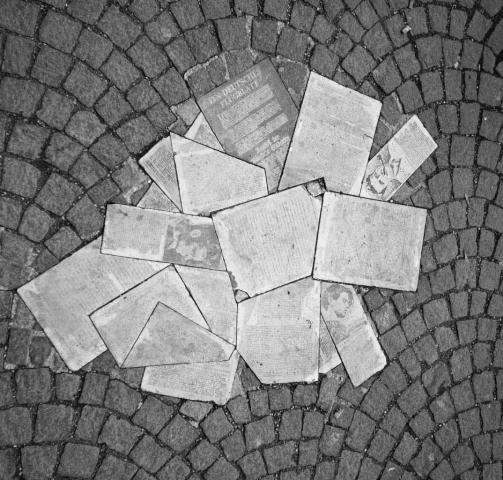
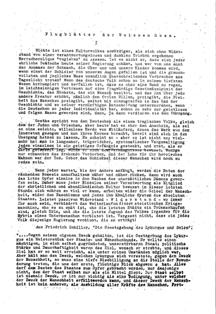 Original Text page 1
Original Text page 1


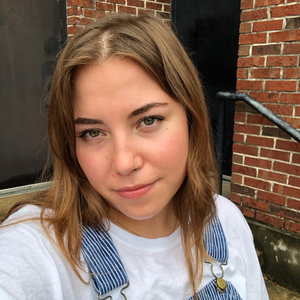 Baylee Robertson is a theater artist and sewing professional based in New Orleans. Their recent designs include THE SEAGULL OR HOW TO EAT IT, CLOTHES FOR A SUMMER HOTEL, and TREASURE ISLAND. Baylee is a graduate of Loyola University of New Orleans and is also a MCA graduate (17'). Never ending thanks to my friends, my partner MG, and my cats for their support. Finally, to Kristi Jacobs-Stanley, thank you for introducing me to theater, you are the teacher that expanded my world. Much love to all of STK.
Baylee Robertson is a theater artist and sewing professional based in New Orleans. Their recent designs include THE SEAGULL OR HOW TO EAT IT, CLOTHES FOR A SUMMER HOTEL, and TREASURE ISLAND. Baylee is a graduate of Loyola University of New Orleans and is also a MCA graduate (17'). Never ending thanks to my friends, my partner MG, and my cats for their support. Finally, to Kristi Jacobs-Stanley, thank you for introducing me to theater, you are the teacher that expanded my world. Much love to all of STK.
 As an MCA alumna, Emily '16 is honored to be back in the PAC- this time working on the creative team! Post MCA graduation, she went on to gain a B.S. in Theatre and a B.F.A. in Dance from Northwestern State University while performing in countless musicals, dance concerts, and other projects throughout her undergraduate career.
In 2018, she spent a little over a month in the small town of Kiefersfelden, Germany, through the International Performing Arts Institute to study theatre and dance alongside her peers - and the view of the stunning Bavarian Alps. In summer 2019, she was contracted to travel to Pagosa Springs, CO to spend three months performing in their repertory season of Jekyll and Hyde, The Who's Tommy, Mamma Mia!, and Alice in Wonderland.
As an MCA alumna, Emily '16 is honored to be back in the PAC- this time working on the creative team! Post MCA graduation, she went on to gain a B.S. in Theatre and a B.F.A. in Dance from Northwestern State University while performing in countless musicals, dance concerts, and other projects throughout her undergraduate career.
In 2018, she spent a little over a month in the small town of Kiefersfelden, Germany, through the International Performing Arts Institute to study theatre and dance alongside her peers - and the view of the stunning Bavarian Alps. In summer 2019, she was contracted to travel to Pagosa Springs, CO to spend three months performing in their repertory season of Jekyll and Hyde, The Who's Tommy, Mamma Mia!, and Alice in Wonderland.
 Taylor is psyched to be stage-managing Antigone in Munich in her senior year at Mount Carmel. Taylor's been involved in STK's tech crew since eighth grade and is so thankful for all the memories and friends she's made since then. She would like to thank Lana Barbe for all of her hard work and dedication and for being a super sick ASM. Taylor would also like to wish the cast and crew a big leg-breaking!
Taylor is psyched to be stage-managing Antigone in Munich in her senior year at Mount Carmel. Taylor's been involved in STK's tech crew since eighth grade and is so thankful for all the memories and friends she's made since then. She would like to thank Lana Barbe for all of her hard work and dedication and for being a super sick ASM. Taylor would also like to wish the cast and crew a big leg-breaking!

 Maddie ‘23 is honored to be the light designer for Antigone In Munich. Maddie began her time in STK as an apprentice, but she has now been the light designer for three years. She is incredibly excited for her final production and is thankful for all the experience that STK has given her. She wants to thank her co-designer Katie Glynn and her apprentices Graycen and Savannah along with the rest of the amazing cast and crew. Enjoy the show!
Maddie ‘23 is honored to be the light designer for Antigone In Munich. Maddie began her time in STK as an apprentice, but she has now been the light designer for three years. She is incredibly excited for her final production and is thankful for all the experience that STK has given her. She wants to thank her co-designer Katie Glynn and her apprentices Graycen and Savannah along with the rest of the amazing cast and crew. Enjoy the show!
 Amy Gegenheimer ‘24 is honored to be Sound Head and Sound Designer again for STK’s production of Antigone In Munich. After being on stage for 18 productions at St. Philip Neri and 2 at Mt. Carmel’s Summer Drama program, she shifted her focus to Sound. She recently worked on STK’s set design and film crew for “A Simpler Time," then became Sound Head for STK’s productions of “Emma! A Pop Musical,” “Shakespeare Lite,” and "Matilda." Amy has worked at Rivertown Theaters as QLab operator for “Matilda,” “Mary Poppins,” and “Raise Your Voice 5.” Amy also was awarded State Champion in Technical Theater for Sound Design at the Louisiana Thespian Festival in January 2022 and 2023 and received a Superior rating on her Sound IE at the International Thespian Festival this past summer. Amy heads the sound crew, mixes the sound, and creates and queues all sound effects for all STK products. She is excited for the years to come and hopes you enjoy the show.
Amy Gegenheimer ‘24 is honored to be Sound Head and Sound Designer again for STK’s production of Antigone In Munich. After being on stage for 18 productions at St. Philip Neri and 2 at Mt. Carmel’s Summer Drama program, she shifted her focus to Sound. She recently worked on STK’s set design and film crew for “A Simpler Time," then became Sound Head for STK’s productions of “Emma! A Pop Musical,” “Shakespeare Lite,” and "Matilda." Amy has worked at Rivertown Theaters as QLab operator for “Matilda,” “Mary Poppins,” and “Raise Your Voice 5.” Amy also was awarded State Champion in Technical Theater for Sound Design at the Louisiana Thespian Festival in January 2022 and 2023 and received a Superior rating on her Sound IE at the International Thespian Festival this past summer. Amy heads the sound crew, mixes the sound, and creates and queues all sound effects for all STK products. She is excited for the years to come and hopes you enjoy the show.
 Alyssa Schaubhut '24 is so excited to be a part of Antigone in Munich as Sound Head! She worked for the set crew during “A Simpler Time” and “Emma! A Pop Musical,” has been on sound crew for “Shakespeare Lite” and “Matilda,” and was sound crew head for Antigone in Munich at Mount Carmel Academy! She will be working Q-Labs and will be playing the sound effects for this performance. She is excited to have this opportunity and hopes you enjoy the show!
Alyssa Schaubhut '24 is so excited to be a part of Antigone in Munich as Sound Head! She worked for the set crew during “A Simpler Time” and “Emma! A Pop Musical,” has been on sound crew for “Shakespeare Lite” and “Matilda,” and was sound crew head for Antigone in Munich at Mount Carmel Academy! She will be working Q-Labs and will be playing the sound effects for this performance. She is excited to have this opportunity and hopes you enjoy the show!
 Brooke Oliver is a junior who has been involved in STK since 2019. She has been an active crew member since 8th grade and has recently adopted the title of Props Co-Head with Rachel Hartman. Brooke is looking forward to continuing to dedicate her time to the Props Department of STK alongside her Co-Head.
Brooke Oliver is a junior who has been involved in STK since 2019. She has been an active crew member since 8th grade and has recently adopted the title of Props Co-Head with Rachel Hartman. Brooke is looking forward to continuing to dedicate her time to the Props Department of STK alongside her Co-Head.
 Rachel Hartman is a Junior Pink Panther in the class of 2024. She has been in STK since 8th grade and has always been on the props crew. For Shakespeare Light and Matilda, Rachel was an apprentice. This year she became a props crew co-head with her best friend, Brooke Oliver.
Rachel Hartman is a Junior Pink Panther in the class of 2024. She has been in STK since 8th grade and has always been on the props crew. For Shakespeare Light and Matilda, Rachel was an apprentice. This year she became a props crew co-head with her best friend, Brooke Oliver.
 Sophia I love you so much, you’re the best co-head I could ask for <3 to all my other crew heads, I love y’all and thank y’all for all y’all do!
Sophia I love you so much, you’re the best co-head I could ask for <3 to all my other crew heads, I love y’all and thank y’all for all y’all do!
